Best Allergy Medicine
Best allergy medicine for itchy eyes
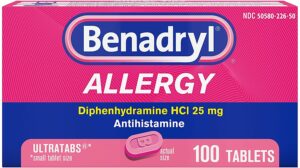
Best allergy medicine for runny nose
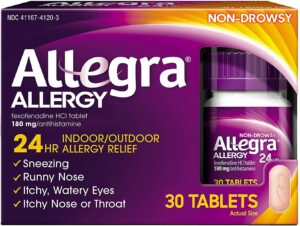
Best allergy medicine for congestion
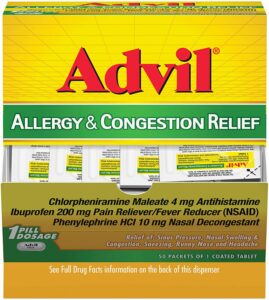
Best allergy medicine for kids
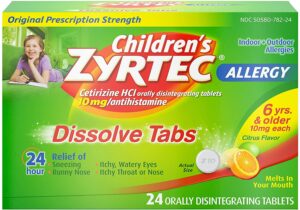
Best non-drowsy allergy medicine
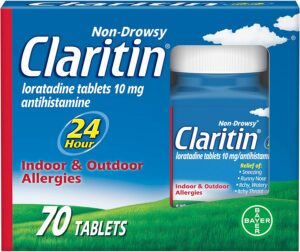
What causes my allergies?
What allergy medicine works the best?
With a variety of allergy medicines on the market, it’s hard to know which one is right for you and your allergies. Let’s break them down by type —
Antihistamines
Oral antihistamines are a very common way to battle allergy symptoms. Allergic reactions cause your immune system to release histamines as a response to sensing the “foreign body”. The antihistamines in allergy medicine lessen or block these histamines before they can trigger your immune system’s response that causes inflammation and other allergy symptoms. The downside to these allergy meds is the drowsy side effect that makes them hard to use during the day. (If you’ve ever taken Benadryl, you know what we’re talking about.) Thankfully there are also non-drowsy options — like Claritin or Zyrtec — known as second- or third-generation antihistamines.
Decongestants
Decongestants fight the inflammation and swelling that causes nasal and chest congestion and itchy, watery eyes. Sudafed is one of the most popular decongestants on the market — however, many people can’t handle it’s main active ingredient, pseudoephedrine, and its side effects. Robitussin and Mucinex are other popular decongestants for people who can’t tolerate or prefer something other than pseudoephedrine.
Eye drops
If itchy, irritated eyes are your main problem during allergy season, eye drops may be your best option. There are two types of drops to choose from — antihistamine and decongestant eye drops. Antihistamine drops (i.e. Optivar, Emadine, and Livostin) are the most common to use and will alleviate your symptoms almost immediately. They don’t, however, last very long so you’ll need to use them throughout the day.
For general redness in your eyes, decongestant drops (i.e. Clear Eyes, Refresh, Visine) are a great solution to quickly relieve the bloodshot appearance. These do come with possible long term risks if used for too long, so it’s best to use these more sparingly.
Nasal steroids
Runny or stuffy noses and sneezing are common with both seasonal or year-round allergies. Corticosteroid nasal sprays, like Flonase, Nasacort, or Rhinocort, are a popular answer to help clear up your nasal passages. They are typically thought to be more effective than antihistamines or decongestants, but they take longer to kick in and you have to use them regularly in order to continue seeing the effects.
Best allergy medicine for itchy eyes

These Benadryl Ultratabs contain 25 mg of diphenhydramine HCl, a powerful antihistamine that provides relief from allergies when you need it most. Whether your allergies stem from indoor or outdoor stimulants, Benadryl helps eliminate symptoms like sneezing, runny nose, and itchy eyes to keep you feeling comfortable day and night. The small tablets are safe to use for adults and children ages 6 and up.
Best allergy medicine for runny nose

One Allegra pill is all you need for 24 hour relief from your worst allergy symptoms like sneezing, runny nose, itchy throat, and watery eyes. It’s formulated with fexofenadine, a fast acting non-drowsy antihistamine that starts working in as little as one hour. Great for both indoor and outdoor allergies, Allegra offers powerful multi-symptom relief to get you through your day without hindering your energy levels.
Best allergy medicine for congestion

Advil Congestion Relief is a great choice to knock out a variety of sinus and allergy symptoms like nasal swelling, sneezing, runny nose, and sinus pressure and headaches. The powerful three-ingredient formula (ibuprofen, antihistamine, and nasal decongestant) works to relieve these symptoms with just one pill once a day, safe for those 12 years and older.
Best allergy medicine for kids

Zyrtec has kids covered with their Children’s Allergy Relief Dissolving Tablets to provide all-day relief of allergy symptoms like runny nose, sneezing, and itchy and watery eyes. Each citrus-flavored tablet is made without added sugar and simply melts on the tongue to make relief simple. This allergy medicine contains 10 mg of the antihistamine cetirizine HCl to give your child all day relief and is recommended for ages 6 and older.
Best non-drowsy allergy medicine

These powerful non-drowsy antihistamine tablets provide relief from symptoms triggered from over 200 allergens including pet dander, pollen, dust, and mold. They help alleviate your symptoms for a full 24 hours to keep you allergy-free day after day. Claritin is available in small tablets, easy-to-swallow gel capsules, and tablets that melt in your mouth, making it easy for adults and kids ages 6 and up to get allergy relief.
FAQs about Allergy Medicine
What is the most effective OTC allergy medicine?
Finding the most effective over-the-counter allergy medicine is dependent on the symptoms you’re experiencing and the type of allergen that’s triggering them. In general, antihistamines are considered the most effective and popular option for seasonal and year-round allergies.
Are there other ways to battle allergies other than medicine?
Even with allergy medicine, some people may not find total relief from their symptoms. A few other ways to help alleviate your allergy symptoms include:
- Staying indoors on windy days when pollen and other allergens are more airborne.
- Wearing a mask when doing yard work or when you know you’ll be exposed to other allergy triggers.
- Buying an air purifier for the rooms in your home to battle indoor allergens.
If OTC medicine and other precautions don’t help me, is there anything else I can do?
If you’ve tried multiple medicines with no relief, talk to an allergist about allergy shots. They perform a test to figure out exactly what allergens are causing your issues and can create a shot formula based on those results. You’ll usually get a shot at least once a week for about 3-6 months. After that, your visits will cut back to every 2-4 weeks — that schedule can last anywhere from 3-5 years or until your symptoms improve.

